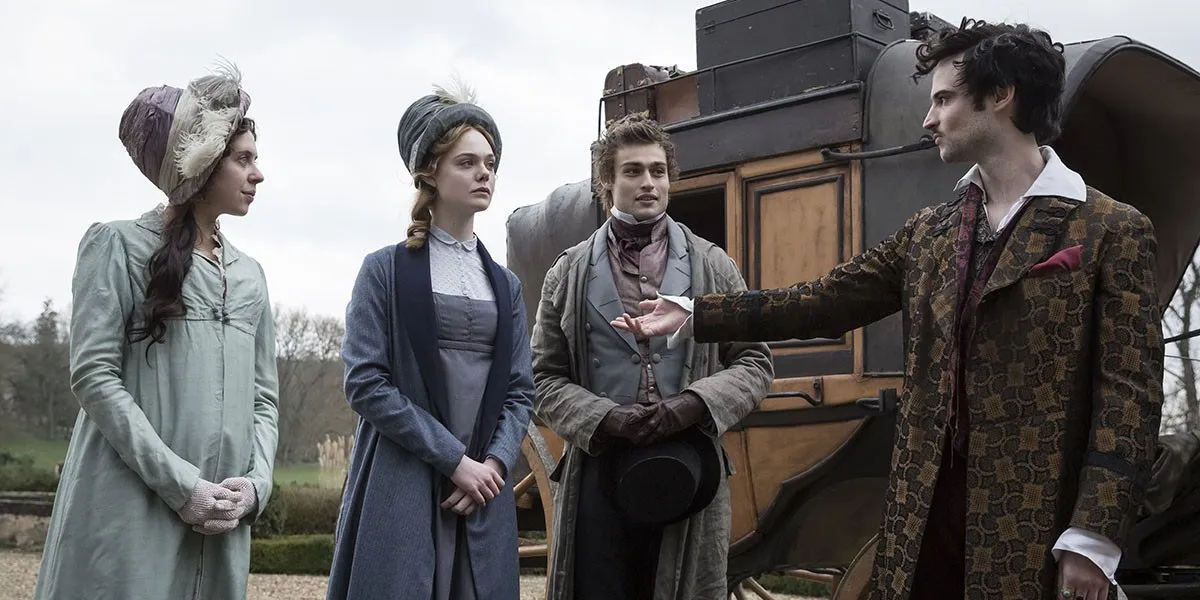Mary Shelley, from director Haifaa al-Mansour, the first female Saudi Arabian director to release a feature film, seems to take the well-worn tale of the young Romantics and peel it back to the sexism and angst underneath.
Many people know that Mary Shelley’s Frankenstein was conceived at a house near Lake Geneva, Switzerland, the result of a challenge. Shelley, who was 18 at the time (and still known by her last name Wollstonecraft Godwin, as she was not yet married, but had run away with Percy Shelley—who was married, only to someone else), her poet lover Percy Shelley, their friend Lord Byron, and Byron’s doctor John Polidori decided to have a competition to see who could produce the best ghost story. Mary began Frankenstein upon this prompt, inspired by the topics of galvanism and the occult that were popular at the time. She would go on to pen a literary classic and breathe life into science fiction as a genre.
Even though Frankenstein is the most well-remembered and regarded literary output from the Geneva trip (though Polidori did create the first published vampire story), both Percy Shelley and Lord Byron tend to loom larger in the public imagination than Mary. We know about their many loves and losses and their tragic deaths. But what was Mary Shelley thinking while she lived through experiences that would seem shockingly modern even to modern audiences?
Al-Mansour’s movie, which stars Elle Fanning as a young Mary, would appear to both sensationalize Mary’s life as well as give it a feminist perspective we rarely see in depictions of the Romantics. In one of the first pictures we saw of Mary Shelley, Mary is sitting and writing by the grave of her mother Mary Wollstonecraft, an early advocate of women’s rights and the author of A Vindication of the Rights of Woman.
Here’s Our First Look at Elle Fanning as ‘Mary Shelley’ https://t.co/fXocpf6bST pic.twitter.com/uPuVkeVm70
— Romance Authors (@Romance_Authors) February 10, 2017
Wollstonecraft died days after Mary’s birth, but Mary felt inspired and shadowed by her mother’s work her whole life. Wollstonecraft is now considered one of the founding mothers of feminism; it’s fitting that the daughter she never knew would help carry the torch in her own way. The movie is “filled with a righteous feminist fire,” per Variety.
According to The Hollywood Reporter, here’s what we’ll see from Mary Shelley:
After marrying poet Percy Shelley (known for “Ozymandias”), Mary Wollstonecraft Godwin writes her first novel in reaction to Romantic writer Lord Byron’s insistence that women can’t write fiction. “The woman is not intelligent enough to form ideas of her own,” he tells her.
But when she publishes Frankenstein under her married name, Shelley, readers begin to believe that her husband in fact wrote the novel, and she has to fight to prove that the story is her own.
Indeed, in the trailer above, Byron appears to be made out as a sort of villain—not too far beyond the bounds of reason, considering the outrageous things he got up to. But I’m most excited to see Mary fight the sexist system to make her mark as a writer. Hopefully the movie will also focus on Mary’s relationships with the women around her as well as the more famous men. Game of Thrones‘ Maisie Williams is playing Mary’s childhood friend Isabella Baxter, and Bel Powley is Claire Clairmont, Mary’s stepsister and Byron’s lover and enough drama all on her own to command a sequel that I’ll begin writing right now.
That Mary Shelley is coming from al-Mansour, who has explored the hidden lives of women in her movies before, feels all the more promising. “We wanted to portray a strong woman who is willing to step out of line and find her own voice,” al-Mansour told THR.
Mary Shelley hits theaters May 25th. This looks like the kind of movie I adore, and I already want it available on Netflix so that I can go home and watch it immediately. Does it seem like your cup of tea?
(via The Hollywood Reporter, image: IFC)
Want more stories like this? Become a subscriber and support the site!
—The Mary Sue has a strict comment policy that forbids, but is not limited to, personal insults toward anyone, hate speech, and trolling.—










Published: Apr 13, 2018 03:25 pm